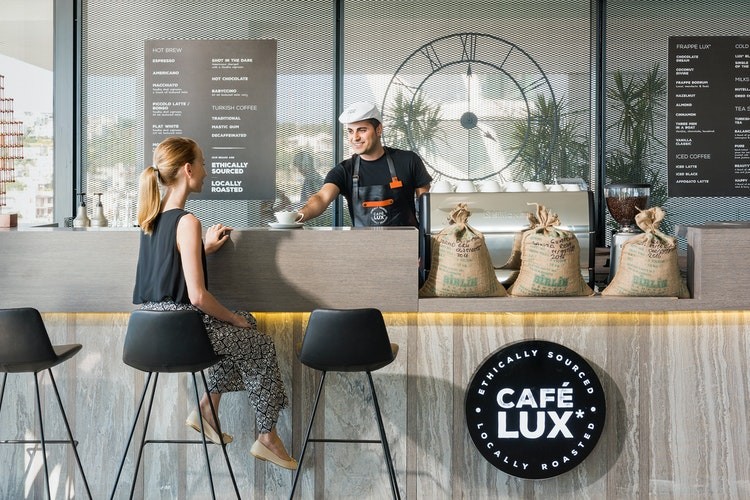
Making a franchise investment is a huge commitment and, even in a profitable sector like food service, getting it right matters. Creating a detailed franchise business plan will help you to start your new professional journey on the right foot. In this article, you’ll discover four top tips for building a business plan for a successful coffee shop franchise.
The cafe and coffee shop industry occupies a market size of £4 billion [IBISWorld]. There’s no question that coffee franchises are in demand among the UK public in 2021, and that you’ll be in a great position as a franchisee to benefit from this demand. Start building your franchise from the ground up with a detailed business plan that covers every base.
>> Read more:
How to build a business plan for your coffee shop franchise
When you invest, you’ll need to create a business plan for your coffee shop. This plan might be something you refer to later down the line, or something you show to your franchisor to demonstrate that you’re on the same page - or even something that you provide to potential funding bodies when searching for funding support. Regardless of its intended audience, there are certain key elements that should be contained within every franchise business plan:
- An executive summary
- A business description
- Product/service descriptions
- A management summary
- Market analysis
- Operational details
- Business premises details
- Sales and marketing plans
- Financial projections and requirements
Beyond these key elements, there are certain things that will be especially important when you’re building a business plan for a coffee shop, in particular. Running a coffee shop franchise is a unique experience, and your business plan will need to account for this. Keep reading, and you’ll discover four of Point Franchise’s top tips for creating a great plan, specifically for a cafe or coffee shop franchise...
1. Get detailed about the coffee products on offer
This part of the business plan is something you’ll likely work on in conjunction with your franchisor, but it’s still extremely important to get right - and it’ll definitely be information that potential funding backers want to know. There are so many different kinds of coffees and hot drinks sold in coffee shops in this day and age, and you’ll need to be clear about what your menu will include and how cohesive themes will be conveyed through these products.
You’ll also need to specify things like origin and quality, as a focus on these aspects has become a trend among coffee drinkers. Many now have expensive tastes that spell good things for your franchise’s profitability. Beyond espressos, lattes, cappuccinos, macchiatos, americanos, mochas and iced coffees, you should also be thinking about your food menu. What will customers be able to eat with their incredible coffee when they visit your franchise location? Some common accompanying food options in coffee shops include:
- Pastries
- Cakes
- Breakfast options
- Lunch options
- Snacks
2. Give time and thought to the financial details
Financial projections and financial planning will be especially important as you launch your coffee shop franchise, as there are many different monetary demands involved in the successful running of a coffee shop. There’s your initial investment, there’s rent on a commercial cafe space, there’s food and beverage costs, there’s equipment costs, there’s staff costs - you get the picture.
It’s particularly important to get these estimations as close to accurate as they can be if you’re planning to share your business plan in hopes of receiving additional funding, as these accurate estimations will then allow you to make accurate financial projections, painting a realistic picture of where your business might be in one year, or even five.
Financial projections use existing or estimated financial data to forecast your business’s future income and expenses. They often include different scenarios so you can see how changes to one aspect of your finances (such as higher sales or lower operating expenses) might affect your profitability.
- Score
3. Consider your short and long term goals
Goal-setting is an important part of franchising. Spare some time in your business plan to outline your goals for the business, both in the next year or so and in the next ten. This will be something you can look back on at a later date in order to assess your progress and check in with yourself. Have your goals changed? Have they stayed the same? Are you on your way to accomplishing them, if they are still what you want?
Examples of goals that you might set for yourself in the short term include reaching profitability, building a trusted team of employees and increasing your customer base by a certain amount/to a certain figure. Examples of goals that you might set for yourself in the long term include becoming a multi-unit franchisee, increasing your community outreach, and increasing your profits. As you consider and list these goals, make sure to account for:
- The terms of the franchise agreement
- The level of support provided by the franchisor
- The franchisor’s buy-back rules
- Whether you’d like to sell your business when you retire
>> Read more:
4. Focus on your coffee franchise’s USP when planning marketing strategies
As touched upon above, the coffee shop sector is undeniably huge and competitive, and demand is only increasing. Costa Coffee exemplifies this growing desire. 10 years ago, the popular chain had just over 170 units. Now, it has 2,300 [British Franchise Association]. When you make a career change with a coffee shop franchise, your best chance at success will be your ability to stand out in a saturated market.
When you reach the part of your business plan at which you’ll need to make marketing plans, you should brainstorm (again with the permission and potential input of your franchisor) how your advertising can showcase that your coffee shop is distinct, and worth visiting. You could emphasise, for instance:
- Your range of options to suit different dietary requirements e.g vegan food, gluten-free food, so on
- Your environmental and social commitments
- Your speciality coffee
- Home delivery options
- Coffee subscription boxes
You might also choose to stand out using promotional offers and discounts in your advertising, giving potential customers a limited time to claim a free or reduced cost item and driving traffic towards your store. Once you’ve created a customer, half the battle is over - you’ll then just need to work to turn them into a repeat customer by providing them with a great coffee shop experience.
With so many businesses offering the same types of products and services, you can only win over your competition if your offer is available for a particular customer at a particular time and theirs is not – or if your product or service offers something that theirs does not.
- Owen Gough, Growth Business
Enter the coffee shop industry and start running your own business successfully with these business plan tips
If you’re now more certain than ever that you could thrive as a franchisee in the coffee industry, stay on Point Franchise and continue your research. Find out exactly how to become a barista, or discover the wide range of options available via this article all about choosing the coffee shop that’s right for you.
Cara Squires, Point Franchise ©
>> Read more articles on the Coffee, Cafe & Coffee Shop sector






0 Comments